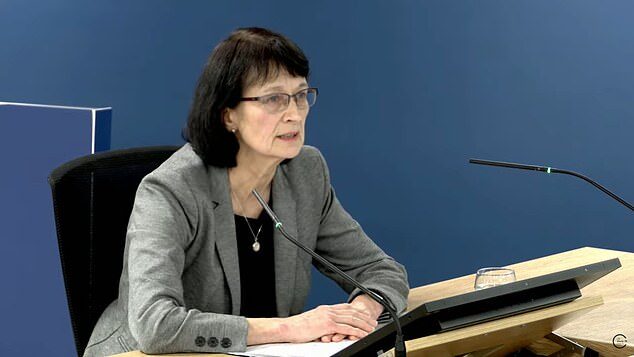
There is no solid proof masks ever slowed the spread of Covid, England's former deputy chief medical officer said today.
Professor Dame Jenny Harries, who now heads up the UK Health Security Agency, said the evidence that coverings reduced transmission is 'uncertain' because it is difficult to separate their effect from other Covid curbs. She also told the UK's Covid inquiry that government advice on how to make a mask using two pieces of cloth was 'ineffective'.
Studies showed at least three were needed for even a small effect on the spread of viruses, Dame Jenny said.
Meanwhile, she warned advice for the public to wear masks during the pandemic may even have given people a 'false sense of security' that they could reduce their risk of becoming infected if they wore one while mixing with others.
Dame Jenny wrote in her witness statement that the evidence base for using face masks in the community 'was, and still is to some degree, uncertain'.
She noted that the evidence for mask wearing varied depending on what materials it was made from. For example, a 'one or two layer cloth covering' is 'not particularly effective', she said.
And if someone doesn't wear it properly - fully covering the mouth and nose - 'it won't work', Dame Jenny added.
The inquiry was shown guidance on how people can make their own face masks from the first wave of the pandemic. In response to the proposals in May 2020, Dame Jenny wrote that advice to use one or two pieces of fabric was 'ineffective'.
She told the inquiry that the evidence at the time said at least three layers were needed 'to give a positive impact' but even this finding 'was not very strong', so the advice was not effective. Dame Jenny also warned that encouraging people to wear face masks led to a 'false sense of security' that people could mix more closely without risk.
Asked about a Government document recommending the use of face masks in May 2020, Dame Jenny said: 'We've got all sorts of safety issues here as well.
'One of the problems in May was when there were a lot of discussions about coming out of lockdown and opening up the economy and various other things - and the two metre, one metre (social distancing guidance).Asked by inquiry chair Baroness Heather Hallett whether this led to a risk of a 'false sense of security', Dame Jenny replied: 'Yes, a false sense of security.
'I think this was landing just about the same time as the "one metre plus" issue.
'The problem we had there was that there appeared to be a view permeating through, and a real concern and risk, that it was being conceived that if you did one metre and you wore a face covering slung round your cheek, or whatever it might be, that was fine.
'So, there was a risk that in encouraging face (masks) people would stop doing the thing that was really important, which was distancing and all the other things.'
'But it was actually also overlapping with what was economically-driven policy, I think, to try and remove some of the distancing rules.'
She said, at the time, she and Professor Sir Jonathan Van Tam, England's former deputy chief medical officer, were 'really trying to highlight what we thought about the two metre and one metre rule discussions'.
Dame Jenny added: 'What was being conceived was if you wear a face covering and reduce everything to a metre, the face covering will make up for the difference, and the answer was no, it won't, and it definitely won't if it's ever not evidence based.'
Dame Jenny also revealed that she wrote to cabinet secretary Simon Case in May 2020, when he was No10 permanent secretary, expressing concern that people may believe they 'could go back to normal' wearing face coverings made from t-shirts, when there was no evidence base around the measure.

'The issue for me at that time, and I think Professor Van Tam shared it, was we definitely shouldn't be supporting something which was not evidence-based if it was going to promote a risk compensation.
'Of course, face coverings, as I know you'll be aware, is a wholly polarised debate and it's quite difficult to maintain a central position, if I'd said: "don't do any of this", somebody would have challenged back and said: "Well, surely there's no harm".
'My main concern was it would have been conceived as a safer way of moving about just when we got through the first tragic wave of a pandemic.'
Asked if she did anything about the concern, she added: 'Yes, well on the one metre, two metre (social distancing suggestion).
'I think this is very much around the same time that the CMO (chief medical officer), CSA (chief science adviser) and the two deputy CMOs wrote to Simon Case, because it was around lifting all the different industries and businesses and sectors at the same time.
'The anxiety was that if people just thought they could get a bit of t-shirt, put it around the face and that would solve all the problems and we could go back to normal, that was not going to be a good public health intervention.'



Why am I still commenting about that crap anyway? I'm outta here.